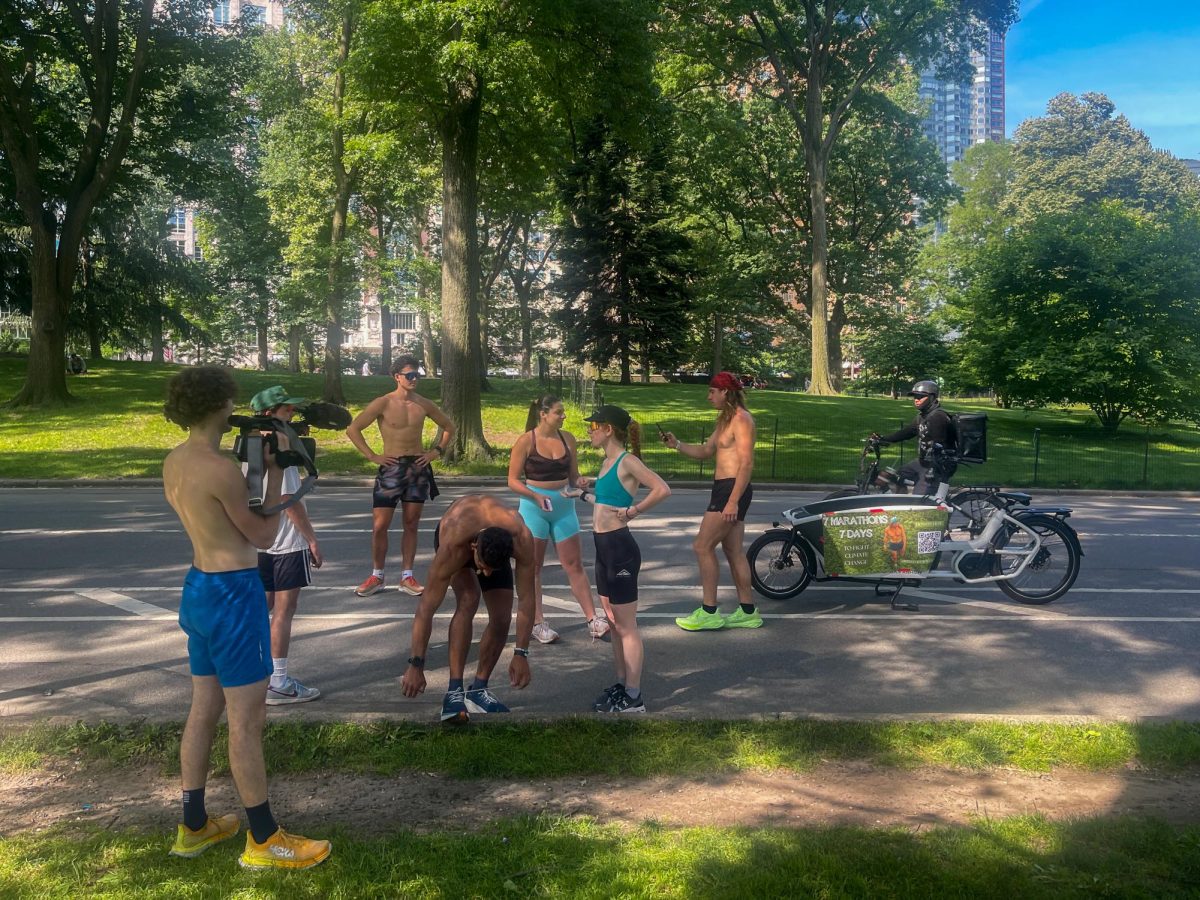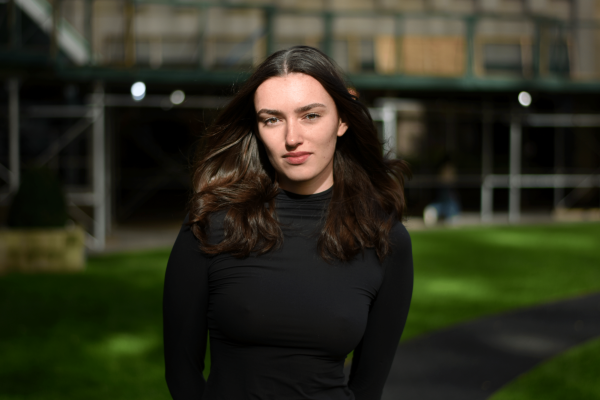Kenny Moll ran seven marathons in seven days to fight climate change. A daunting challenge to underscore a daunting cause. He called this challenge A Week for The World.
The project is for Moll, Fordham College at Lincoln Center ’25, — with help along the way from his family members, girlfriend, fellow activists and friends — to run 26.2 miles a day for an entire week to educate and raise awareness and money for the Sunrise Movement, a youth organization to end the climate crisis through political organizing.
“Running is inherently political and tied to the climate,” Moll said.
Moll is an environmental activist who has worked with movements around the world and locally to actively fight universal injustices.
“For me, fighting for environmental justice is fighting for racial justice, fighting for immigrant justice, fighting for housing justice and Palestinian justice.” Kenny Moll, FCLC ’25
Most recently, Moll stood alongside members of different social justice groups, including Jews for Racial Economic Justice, Undocumented Women’s Fund, Planet Over Profit and the Sunrise Movement to disrupt City Hall against Mayor Eric Adams’ administration’s 30/60 shelter eviction policy.
“For me, fighting for environmental justice is fighting for racial justice, fighting for immigrant justice, fighting for housing justice and Palestinian justice,” Moll said. “The worse the climate crisis gets, it’s going to exacerbate all those other issues.”
Moll has been a fighter his whole life. He was diagnosed with pediatric cancer as a baby, which took one of his kidneys, but he hasn’t let that stop him from running for causes important to him.
Moll took his drive for advocating for the environment and combined it with his passion for running; the latter an extracurricular he was not always dedicated to.
“I’ve always been kind of a terrible athlete,” he said. “I was on the cross country team in high school and I was always faking injuries to get out of meets.”
Moll is an avid marathon runner having run several marathons over the years, including the Chicago Marathon three times, the Jersey City Marathon and, most recently, the New York City Marathon.
After high school, Moll returned to running and realized its effects. He trained with his dad in 2021 to compete in their hometown race, the Chicago Marathon.
“Being able to train with him really sowed the seed in me that this is something you can do with people,” Moll said.
From there, he saw an opportunity to unite people under a common cause. Moll is an avid marathon runner having run several marathons over the years, including the Chicago Marathon three times, the Jersey City Marathon and, most recently, the New York City Marathon.
“While training for marathons over the years, I realized how much time and energy I was spending. I realized I could also be using that time and energy to help fight against climate change, an objective near and dear to my heart,” Moll stated on the A Week for The World website.
“I think seeing how much it resonated with people and how much money we were able to raise and the difference that I think we were able to make pushed me into wanting to do it again.” Kenny Moll, FCLC ’25
The undertaking, however, saw some bumps in the road. Moll’s first attempt took place in Chicago. The very thing motivating the runner was what stopped him in his tracks. Chicago was hit with the same poor air quality and low visibility seen across the country in 2023 due to the wildfire smoke traveling down from Canada.
Even though Moll failed to meet his goal physically the first time around, he met it fiscally, raising over $10,000 for the Sunrise Movement.
“There is a world where I did it once and didn’t do it again,” Moll said.
But then, it came down to the reason why he wasn’t able to continue A Week for The World in Chicago that led him to try again, this time in Central Park in New York City where Moll said he had access to a larger climate activism community.
“It sparked a fire in a lot of other people to be like ‘Oh my God, this is the reason why he’s running. Here’s a clear example of what will happen if we don’t try to make a change.’ So I think seeing how much it resonated with people and how much money we were able to raise and the difference that I think we were able to make pushed me into wanting to do it again,” Moll said.
For his second time around, the goal shifted. Instead of focusing on whether or not he could run seven marathons in seven days, Moll wanted the mandate to inspire people to take action in the climate movement.
“It was just really cool to see people who I know who are very engaged in the running world and not necessarily engaged with the climate action world to take it upon themselves to learn more because of the event, and to then get organized and mobilized with the climate movement simply because of the project and simply because it was presented to them,” he said.
This year’s A Week for The World took place June 9-15 and featured local activists who spoke to the group about their organizations and the climate crisis each day after the marathon was completed, another key contributor to the turnout the project received.
People showed up to listen to members of organizations like Sustainable Ocean Alliance, Planet Over Profit and the Sunrise Movement, to name a few, after speakers spread the word through social media advertising A Week for The World and their educational contribution. Donations for the Sunrise Movement were collected onsite with QR codes and online through social media using a fundraising portal.
“We actually ended up getting a fair amount of people running their first marathon on the last day of the project.” Kenny Moll, FCLC ’25
The marathons themselves acted as a form of outreach, as well. Out of 183 miles he ran, Moll only ran one by himself.
“We picked up a lot of supporters throughout the week,” Moll said. “We really started to build momentum with a lot of people who are in the park all the time. People who don’t normally run, started running more with us. And then we actually ended up getting a fair amount of people running their first marathon on the last day of the project.”
It was clear that Moll’s incentive was working, especially thanks to how accessible running is.
“Anyone can get out and run. It was really fun to see that. But then at the same time, learning that not everyone has the access to actually do that and that even though (running) is, I would say, the most accessible sport, there are still some really big disparities in the cooperation of the sport and who feels excluded from something like that,” he said. “We need clean air, clean water and we need access to outdoor spaces to be able to (run).”
With the help of Moll’s family and friends, he is working to expand the project across the United States and internationally next year.
Moll used running as an opportunity to mobilize people and symbolize the overall theme of climate change. The project showed parallels between running and engagement within the climate movement. People joined Moll on his course who initially claimed to never be a runner or that they could not do it, he said. Similarly, he noticed the same thing about people in relation to their ability to make a difference.
“It was surprising seeing people see that people do have political power and seeing that there could be something done. I think there’s a lot of people who are so entrenched in this belief that everything has gone to hell and that there is no solution. But seeing the light in people’s eyes when they realized something could be done, ‘oh, I can target my climate anxiety somewhere to make a difference,’ that was absolutely the most incredible part of the whole project,” Moll said.
With the help of Moll’s family and friends, he is working to expand the project across the United States and internationally next year. The next step for the team at A Week for The World is to create hubs in different cities and have captains at each site to initiate a global challenge and make the project their own, he said.
“We want to get people plugged in so that they can feel like their voices are being heard throughout the project,” Moll said.
Fordham students can make change and can start by participating in A Week for The World.
“What’s going to protect us is us,” Moll said. “Change occurs when we organize effectively and come together to unite, to focus our energy towards where it matters.”



